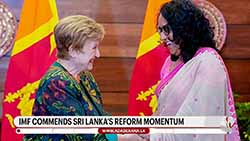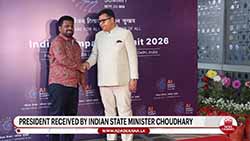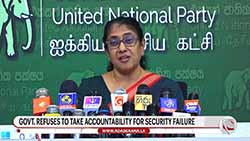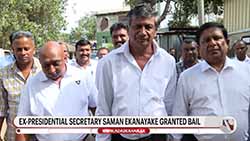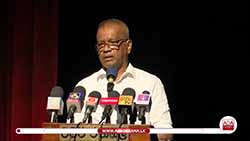Finance Minister rails against rich nations’ green hypocrisy
May 6, 2016 03:48 pm
Sri Lanka’s finance minister, who has helped engineer a growth recovery, tells Emerging Markets that he is fed up with “pontificating” Western politicians telling him to adopt green policies that would end up adding costs for his citizens.
Sustainable development will not be an option for Sri Lanka until the costs involved are lowered, Ravi Karunanayake told Emerging Markets, a sister publication of GlobalCapital in an exclusive interview.
While green financing could bring a new pool of investors to Sri Lanka — something the country is very keen to attract — Karunanayake argued that green investors should not demand a premium.
“Investors can come in but at the end of the day, if they charge a higher price for being green, who is going to pay for that?” he said. “I am being brutally frank but there is no point saying we are with the world if they are not helping us.
“These are the advanced societies that use these words [green and sustainable]. They ruined the climate and now they are pontificating as to how it is going to be cleaned up.”
In just over a year since taking office, Karunanayake has implemented a series of reforms that have reinvigorated the ailing economy. Sri Lanka’s economy is growing strongly with GDP forecast to rise to 5.3% in 2016 and 5.8% in 2017.
But Karunanayake said sustainable development — the focus of this year’s Asia Development Bank annual meeting in Frankfurt — was something that only larger or stronger economies could afford.
“To be frank we like to hear about sustainability but at the same time we can’t afford to have sustainability if it is costing us,” he said. “If we are to be lured into such a thing, it must have its dividends seen and felt. There’s no point saying ‘OK we will do this’ if it is not affordable.”
MORE TO DO
While Karunanayake is already making progress in reinvigorating the economy, he noted there is plenty more to do.
He highlighted the high level of public debt as one of the country’s main problems and noted capital outflows and the Fed increasing US interest rates as other key concerns.
The Sri Lankan rupee has come under pressure in recent months and the central bank’s foreign exchange reserves, which amounted to $6.2bn in March, covered just 80% of short-term external debt.
A recent $1.5bn loan from the International Monetary Fund will help Sri Lanka manage its balance of payments problem and loans from the likes of the ADB, AIB and World Bank allow the government to invest in new projects.
Karunanayake said he approached the IMF loan with caution, particularly because the IMF has proven they are “not all that sensitive” at times and “if you want endorsement, you have to pay a price.”
But he noted that after consideration, the government decided that the situation was a “win-win” because not only did it help address the balance of payments problem but it also because it sent the right message to investors.
“We went into the IMF because we believe it will give the confidence and endorsement that was lacking. It will spark a confidence factor and encourage people to come and deposit their money in Sri Lanka.”
Karunanayake is focussing on encouraging private sector investment in the form of public private partnerships in order to replace the high levels of government-led investments in the region.
The country is also planning to tap the international capital markets and is considering dollars, renminbi, sukuk and Japanese yen to diversify its borrowing portfolio, he said.
“We’re trying to reduce our exposure to foreign currency debt, it is currently 45% of GDP at the moment,” he said. “The new bond will have a longer tenor but lower interest rates.”
BOOSTING TRADE, EXPORTS
Sri Lanka will also focus on diversifying its exports and opening up its markets to trade with areas which had been closed to the administration until recently. Areas of eastern Europe, Japan and Scandinavia are all targets.
“We’re working closely to engage those countries as previously, due to Sri Lanka’s human rights records, many were closed. We’ve recently managed to open up the fishing ban in the EU.”
Karunanayake is hoping to implement import substitution where imports such as agriculture would become exports. Fish, upmarket textiles, industrial products, food, gems and jewels will all be exported in greater volumes.
He emphasised how important it was for Sri Lanka to grow in strength on the inside because of its vulnerability to external currency pressures. “If India and China devalue, we are a small leaf caught in a cyclonic wind,” he said. “We need a strong economy like Singapore. We need to hedge ourselves.”
Source: Global Capital
-Agencies






